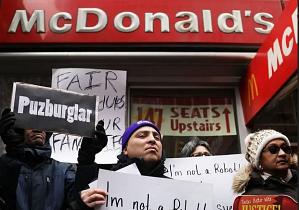New York City just granted protections to fast food workers. It may be a model for protecting essential workers across the country.
At a moment of unprecedented insecurity for millions of American workers, New York City is once again functioning as a vital laboratory for the future of protecting American workers.
In 2019, after the city increased its minimum wage to $15 an hour, states from New Jersey to California followed with plans of their own to boost wages. Now a new law, passed in January and taking effect in July, will strengthen the job security of fast food workers in New York City and could be a model for more localities across the US. That's because after July, employment in the industry will no longer be "at will." Instead, employers will have to show "just cause" for firing workers.
This is a bold and important experiment, one that could bring more stability to workers in a notoriously difficult and high-turnover employment sector. The new law may also hasten a shift toward automation and impose costs on the operators of franchises at a time when New York City is struggling with massive revenue losses. Whatever the results of the new law, it's encouraging to see a major American city move beyond stale talking points in policy debates and actually introduce a forceful, targeted intervention in labor law.
Many experts predicted that raising New York City's minimum wage in 2019 would harm both revenue and employment. But contrary to these doom and gloom predictions, both increased. People were willing to pay a bit more to eat in restaurants, and everyone was able to benefit. This new law could also easily surprise us in a variety of ways.
What are "just cause" protections?
The "just cause" standard, while vague around the edges, can provide powerful protections for workers.
Under the old law, those who did not agree to cover last-minute shifts or work overtime might be fired with relative ease, perhaps on the pretext that they were not a "team player." The language in the new law requires application of "progressive discipline," which means that termination can occur only after a series of graduated interventions proportionate to any infractions of policy.
What's more, this discipline cannot be arbitrarily dispensed according to the fluctuating whims, grudges, or agendas of a particular boss. It must be "reasonable and applied consistently," a substantive legal phrase that provides genuine protection to workers.
In cases of obvious misconduct, fast food restaurants will still be able to fire employees. Assaulting the boss, spitting in the food – any reasonable judge or arbitrators would regard these as just causes for termination. In borderline cases, however, things will become more interesting. Is lagging productivity a legitimate reason for dismissal? A bad attitude that undermines morale without violating any policy? These cases are murkier.




